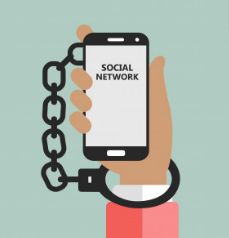Apps evolve to keep people off their phones

May 2, 2018
For most people, social media is cemented into their daily routine. They spend hours logging their day-to-day lives over the internet, with the common mentality being: If it’s not on Snapchat, did it even happen?
Social media sites have figured out exactly what it takes to keep people hooked. From “streaks” on Snapchat to Instagram’s obnoxious notifications, there is no escape from the world of social media. Even those who scroll through Facebook feeds with the most simple of intentions can still be sucked into an hour of food videos.
Due to the addictive qualities of many favorite social media apps, new apps actually have been created to combat the amount of time wasted on social apps. Humans, apparently, cannot control their own intake, so a computer program has been deemed a better fit for the job.
Ironically, the app Space was created by the same company that helps engineer certain apps to be more addictive. Fittingly, the company’s name is Dopamine Labs. On their website, they claim that their app works by using the same math that they use to get people addicted to apps, “only backwards.”
The app Moment, meanwhile, offers a simple solution by tracking a user’s time on the phone and allowing the user to set limits. The app has a 4.5 star rating in the App Store, so apparently the 200,000 monthly active users find it essential to managing their time.
Taking a darker approach, the app WeCroak is an app that constantly reminds people during their social media time that they will indeed die some day. It is based on a Bhutanese folk saying that one must ponder death at least five times a day to stay happy and think about what truly matters.
If there is anything promising from this new era of apps, at least people are recognizing that social media has gotten out of control to an extent and they’re trying to do something about it.
But it seems slightly unfortunate that humans’ consumption of the internet has gotten to the point where people do not know how to limit themselves without using another form of the internet. If people rely on apps to help themselves not rely on apps, what does that say about the future of humanity?


